- Home
- Melissa de la Cruz
Alex and Eliza--A Love Story Page 26
Alex and Eliza--A Love Story Read online
Page 26
“Aunt Gertrude was remarkable,” Eliza said. “I suspect Governor Livingston will never set foot in a house occupied by her ever again.”
Alex looked over at Mrs. Cochran, twirling the small vial of smelling salts she had used to revive Eliza in the fingers of one hand. She caught his eye and winked.
Just then the front door clicked open, and a moment later General Schuyler stomped into the parlor.
“It is done,” he said, removing his hat and coat, then handing it to a servant in the hall. He shut the door behind him and took a seat on a chair close to his wife.
“I have persuaded Governor and Colonel Livingston to release you from your engagement and to keep the entire matter strictly en famille. In exchange, Colonel Livingston will not be brought before a court-martial for callously and carelessly jeopardizing the lives of seven Continental soldiers in moving them from their infirmary so that he could throw a party, and of course, his most reprehensible and disgusting actions against a lady shall remain known only to the injured party and her family.” He looked at his daughter with equal parts tenderness and anger. “Though I would prefer to shoot him myself, at least some manner of justice has been done.”
“A scoundrel like that will seek out his own justice eventually,” Alex said with disgust. “Although I, too, wish I could be the one to mete it out.”
“It is behind us now,” General Schuyler said, “and a much brighter future lies ahead. That is, if Eliza will still have you,” he added with a wink at his daughter.
“What?” Eliza said.
“There was a question on the table,” General Schuyler said, “that Colonel Hamilton put to you, before you so rudely fainted into his arms.”
“Oh, I would not call it rude,” Mrs. Schuyler admonished her husband. “I would call it charming.”
“Well, charming or rude, she shouldn’t leave the poor boy hanging!” General Schuyler managed a chuckle.
“The poor boy agrees!” Alex chimed in, looking at Eliza hopefully.
“Wh-what?” Eliza stuttered again. “I mean—” She looked nervously at her parents, but mostly her mother. “Can I? You seemed so against it before.”
“There are families whose greatness lies in their past, and in their legacies,” Mrs. Schuyler answered. “That is a quality much to be admired, for tradition is what binds us as a society. But there are some families, like some nations, whose greatness is a future development, and that quality, though harder to discern than the prestige of manor houses and coats of arms and titles of rank and office, is no less valuable, if, indeed, not more so.”
General Schuyler put his arm around his wife and drew her near.
“What Mrs. Schuyler is saying,” General Schuyler added, “is that it is the Schuylers who would be honored by a union with so brilliant and noble a personage as Colonel Hamilton.”
“So I can marry him?” Eliza said, her eyes flitting between her parents and Alex. “I can say yes?”
“You had better,” Mrs. Schuyler said, “or I shall never forgive you.”
Eliza turned to Alex. Alex felt his body fall away from him. The only thing that kept him rooted to earth was his hand in Eliza’s.
“Then, yes!” Eliza exclaimed. “Yes, yes, and yes, I will marry you! Yes! Yes! Yes!”
36
Poor Man’s Wife
The Cochran Garden
Morristown, New Jersey
August 1780
For his entire lifetime Alex had been dragging his past behind him like a heavy chain. He was an open man with no secrets to hide, yet he had all the insecurities of an outsider. From his melancholy youth, he was ever needy to earn a foothold in respectable society. Whether by the zest in his pen or the zing of a bullet past his ear, he wanted to make a difference in the New World by his own merit.
It was true he had hitched his horse to General Washington’s wagon with roaring success and was now on the verge of ascending into polite society by becoming one of the Schuyler family. And yet, as much as thriving as the right-hand man to General Washington and becoming the son-in-law to General Schuyler thrilled him, there were always the nagging doubts from the wounds of his childhood. Would people regard him as marrying into the Schuyler family only to access their wealth? How could Eliza Schuyler possibly believe he could provide for her as a husband?
He had written her reams and reams of letters, as well as a poem that she kept folded in a locket around her neck. Her letters were full of love and anticipation, matching his for enthusiasm and tenderness. He was the luckiest man in the world.
Their wedding was set for December, when there would be the winter lull in fighting, and he would be able to take a few weeks off for the ceremony and the honeymoon. But it was now August, and while he did not doubt her love for him, he wanted to make certain she knew what she was getting into.
Taking a few days’ leave to be able to see his beloved, he returned to Morristown, his heart in his hands.
ELIZA DUG HER hands into the dark earth, happy to be out in the sunshine of Aunt Gertrude’s vegetable garden on this hot summer day. Alex had returned from the battlefront unexpectedly that morning and just escorted her home from church. While checking the garden for any hint of greenery to add to Aunt Gertrude’s luncheon table, she found small green squashes already gone to seed.
“Alex, is there anything more beautiful than dropping a seed in the earth and then waiting for it to become something perfectly useful? These tiny seeds will be cucumbers by next midsummer, sitting in the middle of Aunt Gertrude’s table as finger sandwiches. How perfectly practical it must be to be a farmer’s wife.”
Alex circled the flagstone border that enclosed the garden for the third time. It was not often that he could manage a visit, but it appeared there was a certain urgency to this one. He looked like a man who had something to get off his chest, and she’d unintentionally led him right to it with her innocent question.
“How practical must it be, you ask, to be a farmer’s wife, Betsey?” Alex stopped in his circle and approached her straight on. “Rather the question, I should think, is, how practical must one be to be a farmer’s wife? Or a poor man’s wife? How practical must one be to forget about beautiful dresses and elegant dinners and a house full of servants to prepare it all at a moment’s notice? How practical does a poor man’s wife have to be to be content with a book by candlelight instead of a night at the opera? How practical to watch your hands grow rough with gardening and milking and churning and all the work that is to be done just to make it from one dawn to the next?”
Eliza looked at Alex. Ah, so that was his worry. He had said as much, in his lovely letters.
She saw the dread in his face and wanted to make it disappear. “But, my darling, I merely meant I love to garden. And I love to sew. I meant nothing more than that. What is it, dearest, what are you trying to tell me?”
“I fear, Betsey, that our love, deep as it is, is not enough to nurture a lifelong marriage. Marriage is in many ways a business partnership and I fear you are getting the rough end of the deal by marrying me.”
Alex ran his hands through his hair and opened his palms. “I confess I have not been as brilliant in managing my own monetary affairs as I have been in managing the affairs of state. Money and land never seemed to matter to me until now. But now there is you and our future children to consider. I must take care of you in the best way I know how. And I do not know that I am good enough.”
Eliza put down her trowel and brushed off her hands. She’d left her bonnet inside, and her face had quickly pinked up under the sun. She opened her arms to him. “Come here, to me, Alex. I shall show you what I care about.”
Alex found he couldn’t look her in the eye. “Oh, my pretty damsel, when I think of the match you could have made—ah! And here you have chosen me, one who has so little to offer. If happiness were all that it took to make a thing such as
marriage work, we would be set for life. But how can you be sure that ours will not turn into one of those tragic unions that unhappy couples share?”
Eliza laughed. “Perhaps you forget I was raised by a thrifty Dutch woman who managed an entire household while raising a large brood of children. Surely, there is something of practical value in all of that!”
“You make light of it today, but I entreat you. Consider me decades from now. Will you be as satisfied then as you are at this moment with being a poor man’s wife?”
“Silly man. I know the man I am marrying is destined for great things, as the many remarkable things he has done thus far have brought him to such a high point already. Mark my words, Alex. You are a man whose future lies before him for all to marvel at one day. And you, Colonel Hamilton, are mine, and I am yours always.”
He scooped her into his arms once again, his doubts quelled. “I shall never be worthy of you, my angel,” he said. “I know I shall disappoint you in a thousand ways before our time on earth is through. But I hope that you will always see the good in me and know that this unworthy heart of mine will always be yours, no matter what obstacles or failures I bring to your life.”
Eliza pulled away and looked him right in the eye. “I know you, Alex. I know you and I love you, and I shall always love you, come what may. I shall be yours, always.”
37
Wedding March
The Schuyler Mansion, Also Known as the Pastures
Albany, New York
December 14, 1780
At long last, it was time for the wedding. Life being life, and war being war, the heady romance of the proposal endured a nine-months interregnum before it was consummated at the Pastures in Albany. For one thing, Eliza wanted to be married as far from the debacle of Morristown as possible—wanted only to remember Morristown as the place where she had fallen in love with Alex, and not where she had almost lost him, and herself. For another, it was the place where Alex had had his command of the 3rd New Jersey abruptly mooted when General Clinton of the British army stepped up his invasion of Charleston, which after a six weeks’ siege, had fallen in mid-May.
It was altogether a disastrous turn of events, one that left General Washington scrambling to recover and unable to part with his most trusted aide. The Benedict Arnold affair proved even more tumultuous—General Arnold was one of the brightest stars in the Continental army, who had once served with General Schuyler. Thanks in part to Alex’s discovery of his correspondence with Major André, the Continental army was able to foil Arnold’s plan to hand the fort at West Point over to the British. General Arnold himself managed to escape but Major André had been caught and imprisoned. Though Eliza remembered him fondly as the dashing swain who had danced with her on the very night she met her future husband, Alex realized there had been something sneaky about him that night they bumped into him in Morristown at the bonfire.
Though General Arnold had initiated the plan and John André was merely the officer he managed to contact, everyone on both sides of the conflict thought Major André one of the most honorable men in either army. Yet the law was clear, and General Washington’s position inflexible. Though Alex himself asked General Washington for clemency, on October 2, the dashing young officer was hanged for espionage behind enemy lines.
The death shook Eliza deeply, and it was some weeks before she felt ready to move forward with, as she said, “the rest of my life.”
But at last there was a lull in Alex’s duties, and by the end of November, he was able to escape north to the Pastures.
The wedding was on for December 14 at noon.
CATHERINE SCHUYLER STOOD in front of her looking glass, rocking her enormous belly. She was visibly pregnant for the twelfth time in her lifetime and decidedly cranky, but today at noon she would paint a smile on her face and play hostess at the Schuyler family’s grand wedding feast for her second-eldest daughter, Eliza.
A second glance in the mirror did little to calm her nerves. “I look like a stout Dutch milkmaid,” she groused. As the noontime wedding hour approached, there was nothing for it but to lift her chin high and wear a dazzling shawl. She chose a green-and-burgundy-velvet piece, patterned with feathers that spread across her shoulders and ended in gold threaded tassels that dropped below her hips.
Once a striking dark-haired beauty with a long elegant neck, she could hardly remember the pert figure she had been so careless with, but the vanity created by the overheated praise from her groom on their wedding night had stuck with her forever. But as the years passed in a lifetime spent raising her large brood, Mrs. Schuyler had developed a habit of rocking herself to generate a moment of peace. Now she caught occasional murmurs of being called the Rocking Horse by her children and routinely found her husband disappearing into his study each evening after dinner.
Nevertheless, for today—Eliza’s special day—Catherine Schuyler would make every effort to be gracious.
It was to be a small family wedding in the Schuyler home, as was the Dutch custom of the day. Of course, there was nothing small about the Pastures or the extended Schuyler clan. And with the Schuylers, there were always songs to be sung and games to be played inside and out. The general recruited Mr. Vincent to ferry guests back and forth over the ice-packed Hudson in an open sleigh rigged out with the jangling bells of two liveried horses.
As the noonday sun glanced off the snow on that cold December 14, and the parlor began to fill up with first cousins, distant relatives and friends, a Bach sonata for flute and harpsichord signaled the wedding was about to get underway. The southeast parlor, being the grandest in the house, was chosen, wherein were gathered Angelica and John Church, and Peggy and Stephen Van Rensselaer, and Philip Junior and the younger Schuyler siblings, along with the requisite Schuyler, Van Cortlandt, and Van Rensselaer kin.
Anticipating the bride’s entrance, all conversation came to an abrupt halt as guests took their places on either side of the great hall. The family sat in several tiers of chairs, exquisitely yet soberly dressed, except for Angelica, who could not resist a crimson gown.
Waiting in the vestibule for General Schuyler to walk their daughter into the room, Catherine Schuyler crossed her shawl over her large belly and began to rock herself. Not lost on her was the irony of the bride coming down the aisle on the arm of her father: the quaint concept that a woman is under the primary care of her father until she is given over to the keeping of another man. Well, her first daughter Angelica’s ship had already sailed on that passage, so Mrs. Schuyler intended to relish every moment of this, her second daughter’s most elaborate affair.
Although, in hindsight, as practical Eliza had reminded her mother after the wedding costs began to mount up, perhaps Angelica had done the financially strapped Schuylers a considerable favor.
BUT ENOUGH ABOUT her mother, for as much as this was Mrs. Schuyler’s triumph, it was Eliza’s day. And on this very special day Eliza remained true to herself to the last.
Entering the grand foyer to strains of Bach and heads tilting with oohs and ahhs, she represented the picture of modesty and grace in a simple dress of ivory, fitted but without a corset, with thick petticoats to give it shape but nothing so cumbersome or affected as a bustle or train. A thin silver diadem circled her hair, from which hung the palest veil, set with freshwater pearls. Aunt Gertrude’s borrowed cameo provided the finishing touch.
Altogether, the first glimpse of his bride—which should have come as no surprise to Alex, standing there looking so lean and handsome himself—nearly brought him to his knees.
Of course, a young groom always tries to look his best, but Alex was particularly dashing in his blue-and-buff uniform with the gold epaulets and the green ribbon of an aide-de-camp. He had known all along exactly what he would wear—the same stiff number he’d chosen to sit for his portrait by Charles Willson Peale shortly after he joined General Washington’s staff. The yellow buttons gl
eamed on his uniform, and breeches were as brilliantly white as the legs of a hawk. A single curled lock of his ginger hair had escaped the ribbon that held it back and fell rakishly beside his eyes.
But behind that confident façade, even on what should have been the happiest day of his life, there was a sadness he could not name. In contrast to his bride’s enormous tribe, there was no one there to represent his own, despite his best entreaties. Yes, he had sent a written invitation to his estranged brother in St. Nevis to come meet his black-eyed beauty, and he had pressed hard for his father to come to America from the Grenadines, but neither of them had written him back. Indeed, no one from his remaining family would ever meet any of the Schuylers. For Alex to be enveloped into one of New York State’s blue-ribbon families helped put to bed a lifetime of doubts and depression about his own dubious birthright.
Eliza fretted for her fiancé, but he seemed resolute. “You are the only family I need,” he’d told her.
And now the moment had arrived.
The minister began the ceremony with the traditional question for Eliza’s parents. “Do you, General and Mrs. Schuyler, give your blessing to these two, and promise them your continued love and support?”
“We do,” said the Schuylers, “—with God’s help.” An amen chorus from their huge clan echoed their pledge.
Then the minister turned to Alex. There was no one beside him. “And who stands up for you, sir?”

 Gates of Paradise
Gates of Paradise Someone to Love
Someone to Love Pride and Prejudice and Mistletoe
Pride and Prejudice and Mistletoe Serpent's Kiss
Serpent's Kiss The Au Pairs
The Au Pairs Wolf Pact
Wolf Pact Witches 101: A Witches of East End Primer
Witches 101: A Witches of East End Primer Jealous?
Jealous? Cat's Meow
Cat's Meow Misguided Angel
Misguided Angel Birthday Vicious
Birthday Vicious Return to the Isle of the Lost
Return to the Isle of the Lost Rise of the Isle of the Lost
Rise of the Isle of the Lost Angels on Sunset Boulevard
Angels on Sunset Boulevard Double Eclipse
Double Eclipse Blue Bloods
Blue Bloods The Ring and the Crown
The Ring and the Crown The Ashleys
The Ashleys Les vampires de Manhattan
Les vampires de Manhattan The Van Alen Legacy
The Van Alen Legacy Sun-Kissed
Sun-Kissed The Isle of the Lost
The Isle of the Lost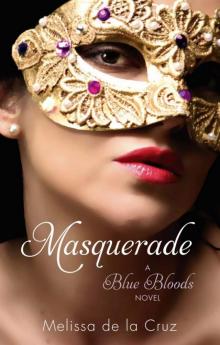 Masquerade
Masquerade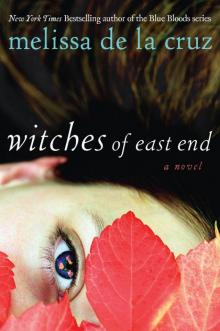 Witches of East End
Witches of East End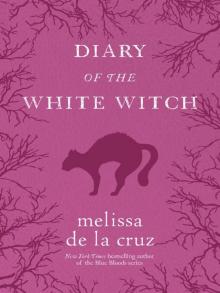 Diary of the White Witch
Diary of the White Witch Crazy Hot
Crazy Hot Lost in Time
Lost in Time White Nights: A Vampires of Manhattan Novel
White Nights: A Vampires of Manhattan Novel Revelations
Revelations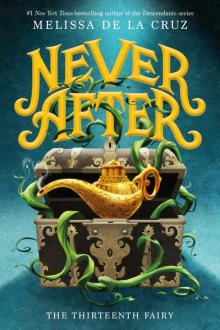 The Thirteenth Fairy
The Thirteenth Fairy The Birthday Girl
The Birthday Girl Lip Gloss Jungle
Lip Gloss Jungle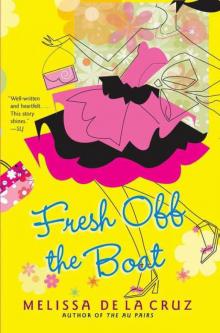 Fresh Off the Boat
Fresh Off the Boat Something in Between
Something in Between Winds of Salem
Winds of Salem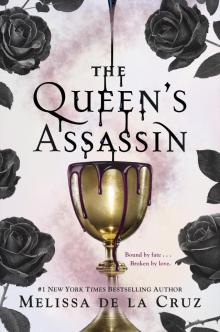 The Queen's Assassin
The Queen's Assassin Love & War
Love & War Social Order
Social Order Skinny Dipping
Skinny Dipping 29 Dates
29 Dates Popularity Takeover
Popularity Takeover Escape from the Isle of the Lost
Escape from the Isle of the Lost Beach Lane
Beach Lane Bloody Valentine
Bloody Valentine All for One
All for One Wolf Pact: A Wolf Pact Novel
Wolf Pact: A Wolf Pact Novel The au pairs skinny-dipping
The au pairs skinny-dipping Lip Gloss Jungle (Ashleys)
Lip Gloss Jungle (Ashleys) Crazy Hot (Au Pairs)
Crazy Hot (Au Pairs) Because I Was a Girl
Because I Was a Girl Blue Bloods 6 - Lost in Time
Blue Bloods 6 - Lost in Time Sun-kissed (Au Pairs, The)
Sun-kissed (Au Pairs, The) Bloody Valentine bb-6
Bloody Valentine bb-6 Golden
Golden Lost in Time_A Blue Bloods Novella
Lost in Time_A Blue Bloods Novella Alex and Eliza--A Love Story
Alex and Eliza--A Love Story Blue Bloods: Keys to the Repository
Blue Bloods: Keys to the Repository Birthday Vicious (The Ashleys, Book 3)
Birthday Vicious (The Ashleys, Book 3)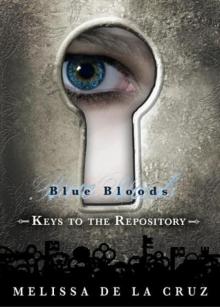 Keys to the Repository
Keys to the Repository Lost In Time (Blue Bloods Novel)
Lost In Time (Blue Bloods Novel) Stolen
Stolen Girls Who Like Boys Who Like Boys
Girls Who Like Boys Who Like Boys the au pairs crazy hot
the au pairs crazy hot Blue Bloods bb-1
Blue Bloods bb-1 Witches 101
Witches 101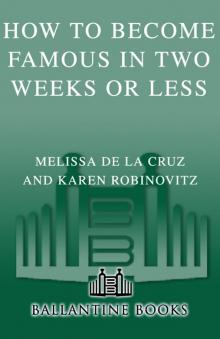 How to Become Famous in Two Weeks or Less
How to Become Famous in Two Weeks or Less Frozen hod-1
Frozen hod-1 Jealous? (The Ashleys, Book 2)
Jealous? (The Ashleys, Book 2) Misguided Angel (Blue Bloods)
Misguided Angel (Blue Bloods) Winds of Salem: A Witches of East End Novel
Winds of Salem: A Witches of East End Novel The Gates of Paradise
The Gates of Paradise Beach Lane Collection
Beach Lane Collection Wolf Pact, The Complete Saga
Wolf Pact, The Complete Saga Gates of Paradise, The (Blue Bloods Novel)
Gates of Paradise, The (Blue Bloods Novel) Vampires of Manhattan
Vampires of Manhattan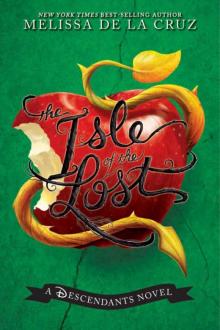 Isle of the Lost
Isle of the Lost Love & War_An Alex & Eliza Story
Love & War_An Alex & Eliza Story The Ashley Project
The Ashley Project Love & War--An Alex & Eliza Story
Love & War--An Alex & Eliza Story